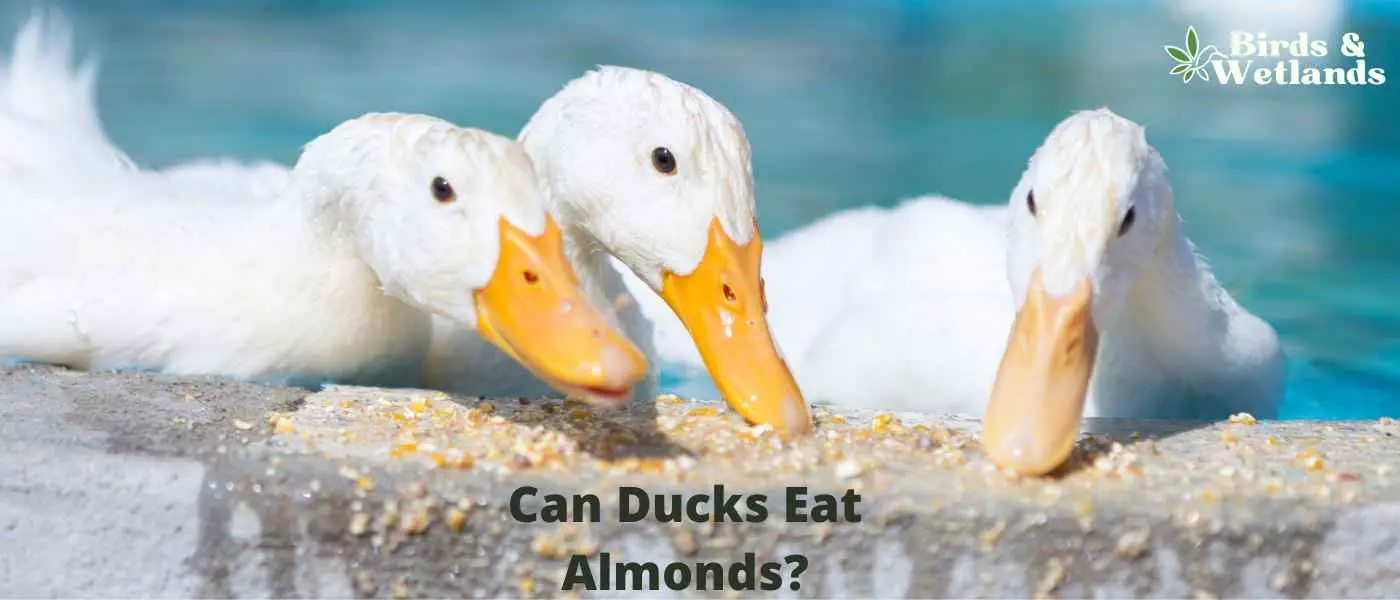Have you ever wondered if ducks can eat almonds? While these nuts can provide some nutrients, it’s important to offer them in moderation and with caution.
In this article, we’ll explore the dos and don’ts of feeding almonds to ducks and discuss why a varied diet of aquatic plants, seeds, insects, and small fish is crucial for their optimal health.
Ducks can eat almonds, but it is essential to offer them in moderation and with caution. Almonds should be unsalted and chopped into small pieces to prevent choking hazards.
While almonds provide some nutrients, they should not be a significant part of a duck’s diet, which should mainly consist of aquatic plants, seeds, insects, and small fish for optimal health.
Almonds are packed with essential nutrients, making them a healthy snack for both people and ducks. While all types of almonds are safe for ducks to eat, bitter almonds should be avoided.
This is because bitter almonds contain a toxin that can be harmful to ducklings. Sweet almonds are the best choice for feeding ducks, as they are safe and nutritious.
- Ducks love to gobble down these nutritious almonds.
- Almonds are seed foods packed with dietary fiber, magnesium and vitamin E, making them nutritious treats for ducks.
- Do not feed ducks bitter almonds. Roasted and unsalted almonds are the best option for duck treats.
What Are the Health Benefits of Feeding Almonds to Ducks?
Almonds are nutritionally dense food packed with nutrients, healthy fats, unsaturated fat and antioxidants that can benefit ducks in many ways. For example, the high magnesium levels in almonds can help reduce stress, while the dietary fiber present can promote a healthy digestive system.
The calcium and phosphorus in almonds are important for proper bone development. Almonds can also help to strengthen the eggshells laid by egg-laying ducks, making them less susceptible to breakage.
Overall, ducks can eat regular almonds and eating almonds can provide a range of health benefits for ducks. If you’re looking to give your feathered friends a little nutritional boost, adding some almonds to their diet is a great way to do so.
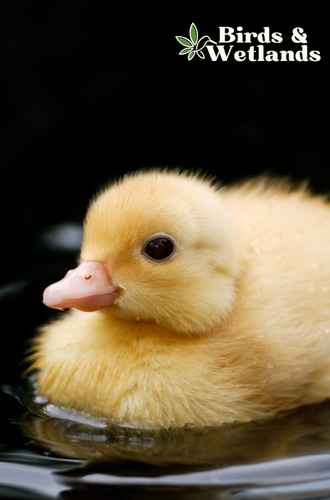
Can Baby Ducks Eat Almonds?
So, can ducklings eat almonds? Baby ducks can eat almonds, but only if they are sweet almonds. While many types of nuts are dangerous for ducks, sweet almonds are safe for them to eat.
It is important to chop the almonds and other nuts into small pieces before feeding them to ducks, as whole nuts can pose a choking hazard. Baby ducks have delicate digestive systems, so it is important to introduce nuts into their diet slowly and in moderation.
As long as these guidelines are followed, feeding baby ducks almonds is perfectly safe and can provide them with a nutritious snack.
Can Ducks Eat Roasted Almonds?
Ducks can eat roasted almonds, but it is important to give them these nuts in moderation. Roasted almonds contain salt, oil, or honey which can be harmful to ducks in large quantities.
It is best to only give a small number of roasted almonds to ducks at a time.
This will ensure that they get the nutrients they need while avoiding any potential health problems.
Can Ducks Eat Raw Almonds?
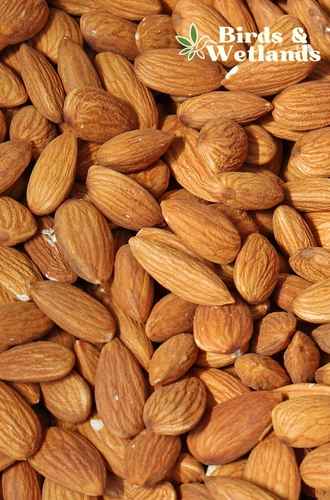
Raw almonds are a good source of protein, fat, and vitamins, making them an ideal treat for your ducks’ health. However, it’s important to note that ducks can’t eat whole almonds.
The hard shell can damage their digestive system, so it’s important to either crack the almond or remove the shell entirely before feeding it to your duck.
With a bit of preparation, raw almonds can be a healthy and delicious snack for your beloved pet duck.
Can Ducks Eat Moldy Almonds?
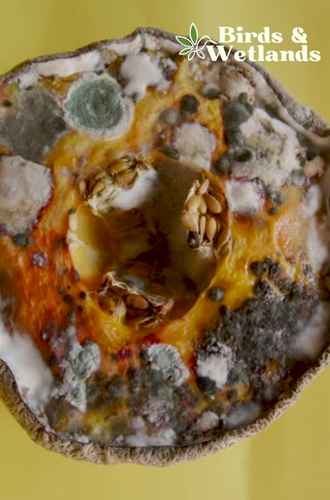
While ducks are generally pretty hardy creatures, there are some things that they should not eat. One of those things is moldy almonds.
Mold can contain harmful bacteria that can make ducks very sick. In some cases, it can even be deadly. If you have moldy almonds, it’s best to throw them out rather than risk feeding them to your ducks.
Ducks rely on us to give them a safe and healthy diet, so it’s important to be careful about what we provide them. Avoiding moldy almonds can help keep our ducks happy and healthy for years to come.
How to Serve Almonds to Ducks
Here are a few things to consider when feeding ducks almonds:
- Introduce almonds into your ducks’ diet gradually.
- Don’t feed your ducks salted or bitter almonds. Bitter or salted almonds are bad for ducks due to their salt content and toxins. Too much sodium in a duck’s diet can impede proper growth.
- Crush almonds in small chunks inside a Ziplock bag using a hammer.
- Use a food processor to grind flaked almonds into fine powder.
- Feed almonds in moderation. Almonds are packed in calories and can become a caloric surplus really quickly if eaten in excess.
- Feed your ducks with duck pellets mixed with almonds, especially their favorite foods.
How Many Almonds Can Ducks Eat?
While adult ducks enjoy the occasional almond as a treat, it is important not to overdo it. Like any other food not part of their standard diet, too many almonds can be bad for ducks.
Never give them more than a handful per day and ensure that this is only an occasional treat, not a daily food.
By following these guidelines, you can ensure that your ducks stay healthy and happy.
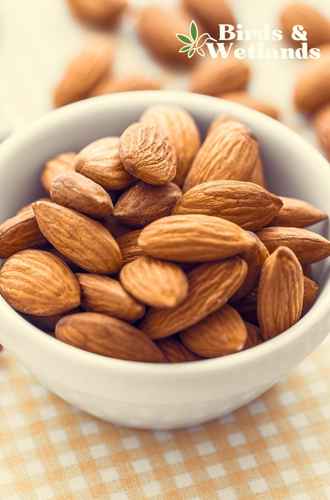
FAQs on What to Feed Ducks
Can Ducks Eat Nuts?
Ducks can eat nuts, including hazelnuts, walnuts, pistachios, pine nuts, pecans, chestnuts and peanuts.
Each type of nut has different nutrients that can provide benefits to ducks. For example, hazelnuts are a good source of omega-3 fatty acids, which are beneficial for the health of ducks’ feathers, skin and beaks.
Walnuts are high in protein and essential for ducks’ growth and development. Pistachios are a good source of antioxidants, which can help protect ducks from disease. And peanuts are rich in vitamins and minerals, which can help keep ducks healthy overall.
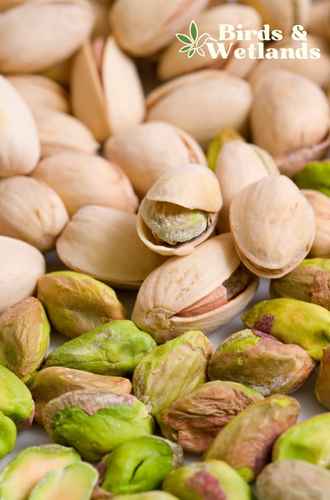
When feeding common nuts to ducks, it’s important to ensure that they are unsalted and unroasted. Roasted nuts can harm ducks, as the roasting process can remove some of the essential nutrients that ducks need.
Nuts should also be given to ducks in moderation, as they are a high-fat food, and too much fat can lead to health problems for ducks. As a general rule of thumb, feeding nuts as a tasty treat should make up no more than 10% of a duck’s diet.
Other Duck Foods to Consider
Best Duck Feed Pellets
Are you a duck owner looking for the perfect feed to keep your feathered friends happy and healthy? Look no further than Purina Duck Feed Pellets! With their nutritionally balanced formula and high-quality ingredients, these pellets are the ultimate solution for providing your ducks with the nutrition they need to thrive.
Pros
- Complete Nutrition: Purina Duck Feed Pellets are nutritionally balanced to provide all the essential vitamins and minerals that ducks need to stay healthy and strong.
- Easy to Digest: The pellets are specially formulated to be easy to digest, which makes them ideal for ducks of all ages.
- Promotes Growth and Development: With its balanced nutrition formula, Purina Duck Feed Pellets are designed to support healthy growth and development in ducks.
- Suitable for All Breeds: Whether you have domestic ducks or wild ducks, Purina Duck Feed Pellets are suitable for all breeds of ducks.
- Trusted Quality: Purina has been producing high-quality animal feed for over 100 years, so you can trust that your ducks are getting the best possible nutrition with Purina Duck Feed Pellets.
Cons
- Cost: Compared to other types of duck feed on the market, Purina Duck Feed Pellets can be slightly more expensive. However, many customers feel that the high-quality ingredients and balanced nutrition formula are worth the extra investment.
- Pellet Size: Some customers have noted that the pellet size of Purina Duck Feed Pellets can be quite large, which may not be suitable for smaller or younger ducks. However, many customers have reported that the pellets can easily be broken up or soaked in water to make them easier to eat.

